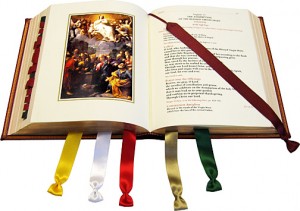The New Roman Missal: The Mystery of Eucharist Union
Beautiful changes have been made to the translation of the prayer that comes shortly before Holy Communion is distributed.
Since Vatican II, the priest has said, “Happy are those who are called to His supper” as he held up the Eucharist. The new translation is more poetic and better fits the solemnity and mystery of the moment. The priest will now proclaim, “Blessed are those who are called to the supper of the Lamb.”
The new words command our attention. They underscore how the Eucharist is no ordinary meal, for they recall a climactic moment in the book of Revelation when Jesus comes to unite Himself to His people in a great heavenly wedding feast: the Supper of the Lamb.
In this scene, Jesus Christ, the Lamb of God, is depicted as the Bridegroom joining Himself to the Church, which is portrayed as His holy elect Bride. An angel announces this loving union by saying, “Blessed are those who are invited to the marriage supper of the Lamb” (Revelation 19:9). In the new translation, the priest at Mass more clearly echoes this angelic invitation to the heavenly wedding feast.
When you hear these words in the liturgy, therefore, you should realize that you are, in a sense, receiving a wedding invitation! Indeed, in a mystical sense, you are already participating in heaven on earth, receiving a foretaste of the celestial banquet that is to come.
At this great marriage feast, you are no ordinary guest. When you walk down the aisle to receive Holy Communion, you walk as the Bride to the Bridegroom. You are being united with your Divine Lord, Who gives you His very Flesh and Blood. Here, we see how the Eucharist involves an intimate, loving communion with our Savior and King Jesus Christ. This union is the archetype of the earthly marital bond.
Amazing the Son of God
In response to this invitation, we will no longer say, “Lord, I am not worthy to receive to You.” Instead, we will say, “Lord, I am not worthy that You should enter under my roof.”
These new words recall the humility and trust of the Roman centurion who begged Jesus to heal his paralyzed servant. As a Gentile outside of the covenant, and as a Roman officer in charge of a hundred soldiers oppressing God’s people, this man humbly recognized his sinful condition. He acknowledged that he—as a gentile, a Roman and a centurion—is unworthy to receive Jesus, the holy Jewish rabbi, into his defiled home: “Lord, I am not worthy to have you come under my roof.”
Yet the Roman centurion also expressed great faith, faith that surpassed that of many Jews. This faith impresses Jesus. Up to this point in the gospels, Jesus had only healed people in His immediate presence: this Roman centurion is so struck by the enigmatic rabbi that he believes He can heal from afar—a long distance miracle—simply by speaking His word: “But only say the word, and my servant shall be healed” (see Matthew 8:8; Luke 7:6-7).
Like the centurion, we, at this moment in the Mass, recognize our own sinful condition and our own unworthiness to receive Jesus under the “roof” of our souls in Holy Communion. Yet just as the centurion believed Jesus was able to heal his servant from afar, so do we trust that Jesus can heal us as He becomes the intimate guest of our souls in the Eucharist. Thus, we will echo the trusting centurion and, eyes downcast, cry to the Lord, “But only say the word and my soul shall be healed.”


